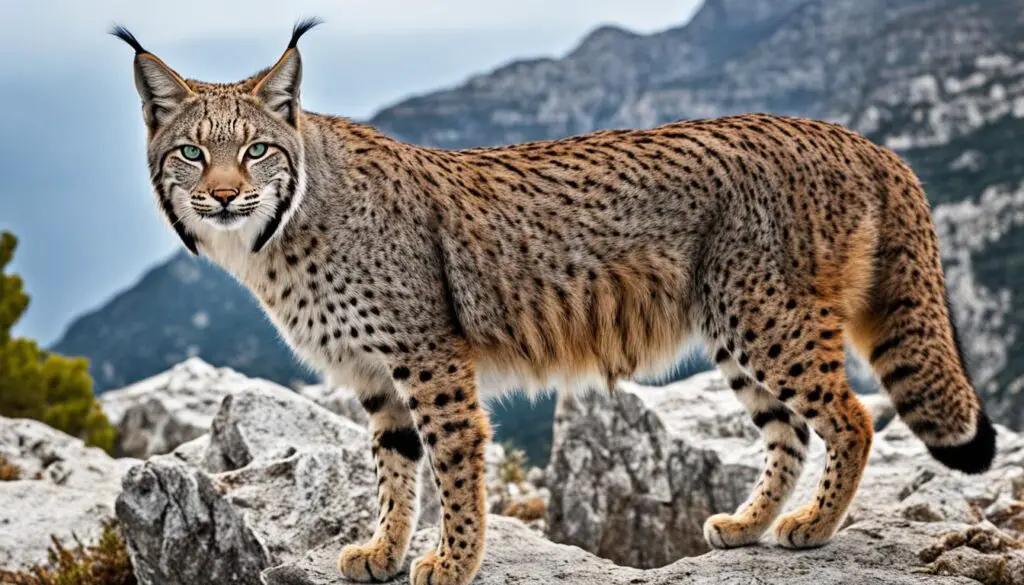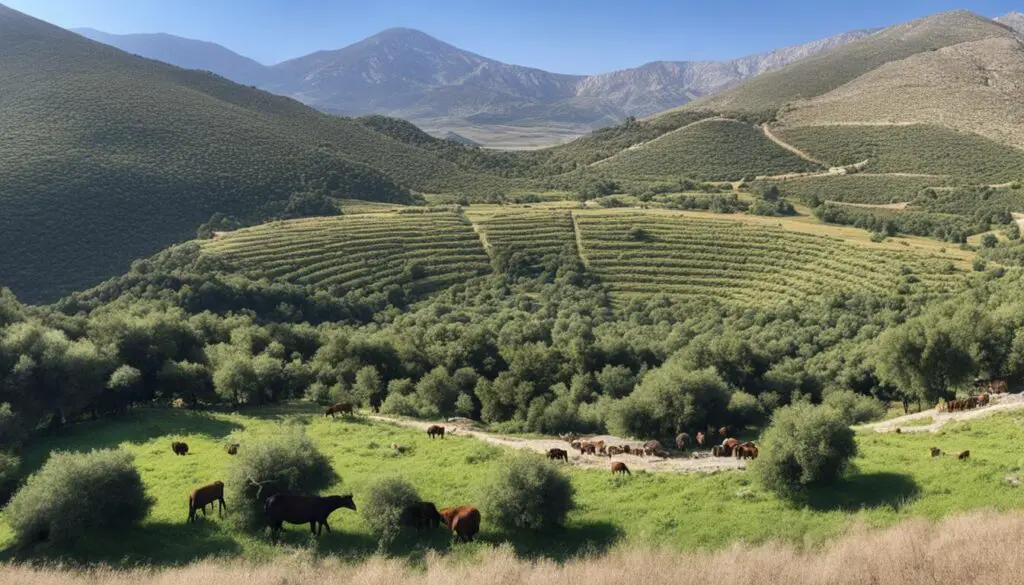Greece, located in southern Europe, boasts a diverse range of flora and fauna within its natural habitats, which include mountains, hills, forests, rivers, lakes, coasts, and cultivated land. The country is home to a rich array of wildlife, including mammals, birds, and marine life. Greece also takes pride in its efforts to protect endangered species and preserve its native animals through wildlife conservation initiatives.

Key Takeaways:
- Greece is known for its diverse wildlife, with various species inhabiting its natural habitats.
- Endangered species, such as the Mediterranean monk seal and the brown bear, require conservation efforts.
- Wildlife conservation initiatives play a vital role in preserving Greece’s fauna and their habitats.
- The country has a wide range of native animals, including larger carnivorous mammals, ungulates, and diverse bird species.
- Greece has established animal sanctuaries, rescue organizations, and implemented animal protection laws to safeguard its wildlife.
Native Greek Animals
Greece is home to a diverse range of native animals, contributing to the rich fauna of the country. From larger carnivorous mammals to avian species and aquatic wildlife, Greece offers a variety of captivating native fauna.
Among the larger carnivorous mammals found in Greece are the European wildcat, the Balkan lynx, and the grey wolf. These majestic creatures roam the country’s forests and mountains, embodying the wild essence of Greece’s natural landscapes.
In addition to these carnivores, Greece is also home to a range of ungulates, including the wild boar, red deer, and fallow deer. These ungulates can be found in various habitats throughout the country, interacting with the ecosystem and contributing to its overall biodiversity.
For bird enthusiasts, Greece is a birdwatching paradise with over 450 bird species recorded in the country. From the melodious warblers to the colorful buntings and the elusive partridges, Greece offers a diverse array of avian species for observation and admiration.
The rivers and lakes of Greece are teeming with aquatic wildlife, including a variety of freshwater fish species that are endemic to the region. These underwater inhabitants contribute to the country’s unique ecological balance and serve as a testament to Greece’s dedication to preserving its natural heritage.
Experience the wonders of Greece’s native animals and immerse yourself in the captivating beauty of its fauna.
Note: The above image showcases the captivating diversity of native Greek animals.
Wildlife Conservation in Greece
Greece is committed to protecting its wildlife and conservation efforts. The country has established several animal sanctuaries and rescue organizations dedicated to rehabilitating and safeguarding wild animals. In addition, Greece has implemented animal protection laws to ensure the welfare of its animal population and prevent cruelty. These initiatives reflect the country’s commitment to wildlife preservation and the promotion of ethical treatment.
One prominent example of preserving Greek wildlife is the establishment of animal sanctuaries. These sanctuaries serve as safe havens for animals that have been rescued from dangerous or harmful situations. The facilities prioritize the rehabilitation and well-being of the animals, providing them with necessary medical care, proper housing, and access to natural habitats.
Greece’s dedication to wildlife conservation is further demonstrated through various animal rescue organizations operating across the country. These organizations work tirelessly to rescue and rehabilitate injured, orphaned, or mistreated animals. Through their efforts, countless animals have been given a second chance at life and released back into their natural habitats, contributing to the preservation of Greece’s diverse fauna.
Animal protection laws play a crucial role in safeguarding wildlife in Greece. These laws aim to mitigate the exploitation, abuse, and illegal trade of animals. They also provide guidelines for responsible pet ownership, ensuring that domestic animals are treated with care and compassion.
“Conservation is a vital step towards safeguarding the future of our wildlife and preserving the natural heritage of Greece.”
Greece has also taken proactive measures to promote animal welfare and raise public awareness about the importance of conservation. Various initiatives educate the public about responsible behavior towards animals, the protection of their habitats, and the significance of biodiversity. By fostering a sense of environmental stewardship, Greece encourages active participation in wildlife conservation efforts.

| Greek Animal Sanctuaries | Animal Rescue Organizations | Animal Protection Laws | Animal Welfare Initiatives |
|---|---|---|---|
| 1. Arcturos Wildlife Sanctuary | 1. Hellenic Animal Welfare Society | 1. Law No. 4039/2012: Protection of Animals | 1. Animal Welfare Education Program |
| 2. Aegina Wildlife Hospital | 2. Greek Animal Rescue | 2. Law No. 3170/2003: Wild Animal Protection | 2. Wildlife Conservation Campaigns |
| 3. Alkyoni Wildlife Centre | 3. Friends of Animals | 3. Law No. 4234/2014: Protection of Domestic Animals | 3. Responsible Pet Ownership Programs |
Endangered Species in Greece
Greece is home to several endangered species, making wildlife conservation efforts crucial for their survival. Two notable endangered species found in Greece are the Mediterranean monk seal and the brown bear.
The Mediterranean monk seal, also known as the monachus monachus, is one of the most endangered marine mammals in the world. Their population has declined due to habitat degradation, pollution, and overfishing. Organizations like Arcturos play a significant role in the conservation of these seals, working towards their protection and the preservation of their natural environment.
The brown bear, scientifically known as Ursus arctos, is another endangered species in Greece. These bears are primarily found in the mountainous regions of the country, including the Pindos Mountains and the Rhodope Mountains. Habitat loss, poaching, and human-wildlife conflicts have contributed to their vulnerable status. Conservation efforts aim to prevent further decline and maintain sustainable populations of brown bears in their natural habitats.
In addition to these specific species, Greece has implemented comprehensive wildlife conservation strategies to protect its diverse range of flora and fauna. The country has established wildlife centers and sanctuaries that serve as safe havens for injured or orphaned animals. These facilities provide hospitalization, rehabilitation, and, whenever possible, the release of wild animals back into their natural habitats.
Conservation efforts in Greece encompass various aspects, including habitat protection, education, and research. By conserving endangered species and their habitats, Greece contributes to the preservation of global biodiversity.
Effectively protecting endangered species requires a collective effort involving governmental organizations, non-profit groups, local communities, and individuals. It is crucial to raise awareness about the importance of conservation and to encourage sustainable practices that minimize human impact on the environment.
| Endangered Species | Status |
|---|---|
| Mediterranean monk seal | Endangered |
| Brown bear | Endangered |
Greek Animal Sanctuaries and Conservation Organizations
Greece is committed to the protection and welfare of animals through various animal sanctuaries and conservation organizations. These institutions serve as safe havens for a diverse range of animals, from wildlife to domestic pets. Notable among them are the Wildlife Hospital in Aegina and the Alkyoni Wildlife Centre in Paros, which provide crucial support for rescued and rehabilitated animals.
The Wildlife Hospital in Aegina plays a vital role in rescuing and caring for injured and orphaned wildlife in Greece. They specialize in treating and rehabilitating native wildlife species, including birds, mammals, and reptiles. The hospital’s dedicated team of veterinarians and volunteers work tirelessly to heal these animals and prepare them for release back into their natural habitats.
The Alkyoni Wildlife Centre, located in Paros, focuses on the welfare and rehabilitation of wildlife in Greece. They offer care and support to injured animals, providing medical treatment and a sanctuary environment to aid in their recovery. The center also implements educational programs and initiatives to raise awareness about Greek wildlife and the importance of conservation.
In addition to sanctuaries, Greece is home to various animal rescue organizations that tirelessly work towards saving and rehabilitating animals in need. These organizations conduct rescue operations, provide medical attention, and facilitate adoption processes, ensuring these animals find loving homes. One such organization is the Greek Animal Rescue, which is dedicated to rescuing and rehoming abandoned and stray animals throughout Greece.

Greece’s commitment to animal welfare extends beyond rescue and rehabilitation. The country has implemented several animal welfare initiatives to promote responsible pet ownership and ensure the well-being of animals. These initiatives include campaigns to promote spaying and neutering, microchipping, and educating the public about the proper care and treatment of animals.
The collective efforts of Greek animal sanctuaries, rescue organizations, and animal welfare initiatives foster a culture of compassion and care for animals in Greece. These organizations work hand in hand with volunteers, professionals, and concerned citizens to protect and preserve the diverse wildlife and domestic animals of this beautiful country.
Conclusion
Greece is a country blessed with abundant wildlife and a rich variety of animal species. From majestic native animals like the wildcat, lynx, and wolf to the diverse array of bird species and aquatic life, Greek wildlife is a true natural treasure. However, with the increasing threats to their habitats and conservation challenges, Greece has taken significant steps to protect and preserve its unique fauna.
One of the key initiatives in wildlife conservation is the establishment of animal sanctuaries and rescue organizations throughout the country. These sanctuaries provide a safe haven for rescued and rehabilitated animals, contributing to their well-being and eventual reintroduction into the wild. These efforts are supported by comprehensive animal protection laws that ensure the welfare of animals and prevent cruelty.
Furthermore, Greece has implemented various animal welfare initiatives that not only promote responsible pet ownership but also raise awareness about the importance of wildlife conservation. These endeavors reflect Greece’s commitment towards creating a sustainable future for its wildlife and preserving the beauty and diversity of its natural landscapes.
In conclusion, with its diverse range of animal species, Greek wildlife has captivated the hearts of nature enthusiasts worldwide. Through the establishment of animal sanctuaries, rescue organizations, and the implementation of animal protection laws, Greece is working towards the conservation and preservation of its remarkable wildlife. By continuing these efforts, Greece is securing a brighter future for its animals and ensuring that future generations can continue to marvel at the wonders of Greek wildlife.
FAQ
What kind of wildlife can be found in Greece?
Greece is home to a diverse range of wildlife, including mammals such as the European wildcat, Balkan lynx, and grey wolf. The country is also rich in bird species, with over 450 recorded. Additionally, Greece boasts a variety of aquatic wildlife in its rivers and lakes, including endemic freshwater fish species.
Are there any endangered species in Greece?
Yes, Greece has several endangered species, including the Mediterranean monk seal and the brown bear.
What conservation efforts are in place to protect Greek wildlife?
Greece has implemented wildlife conservation efforts through the establishment of animal sanctuaries and rescue organizations. The country also has animal protection laws in place to ensure the welfare of animals and prevent cruelty. Additionally, various initiatives promote animal welfare and raise awareness about the importance of conservation.
Are there any specific wildlife conservation organizations in Greece?
Yes, organizations like Arcturos work towards the preservation of wildlife and the natural environment in Greece. The country also has wildlife centers and sanctuaries dedicated to the hospitalization and rehabilitation of wild animals.
What animal sanctuaries and conservation organizations exist in Greece?
Greece is home to several animal sanctuaries and conservation organizations, including the Wildlife Hospital in Aegina and the Alkyoni Wildlife Centre in Paros. These sanctuaries provide a safe haven for rescued and rehabilitated animals, both wildlife and domestic animals. There are also animal rescue organizations that focus on the rescue, rehabilitation, and adoption of animals in need.
